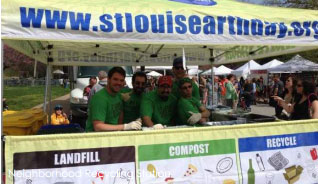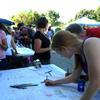Create a Recycling Challenge and Education Program
Recycling is taking reusable materials out of the waste stream and processing them into new materials
Description

Recycling is taking reusable materials out of the waste stream - diverting them from the landfill - and processing them into new materials. Materials such as cardboard, plastic, metal, glass, and paper are commonly recycled in the home and neighborhood. Composting is a method of recycling organic waste such as food scraps, and can also be part of a neighborhood campaign to reduce waste. A recycling challenge or educational campaign gets people informed and excited about reducing waste and saving money. St. Louis has a recycling system, so the infrastructure already exists to boost recycling in your neighborhood and reward your community.
Related Tools
When paired with other tools, a recycling challenge, composting program, or education campaign can contribute to a more holistic sustainable neighborhood. Think about reducing landfill waste, saving energy and money, or cleaning up your neighborhood. Try combining recycling with:
Community Projects
Get inspired by related local projects
-
 Dogtown Sustainability Celebration
The Dogtown Sustainability Celebration (DSC) involved residents from the Dogtown community...
Dogtown Sustainability Celebration
The Dogtown Sustainability Celebration (DSC) involved residents from the Dogtown community...
Neighborhood Benefits
Environmental
- Reduced landfill waste
- Conserved energy, water, and raw materials
- Reduced greenhouse gases, air pollution, and soil pollution in landfills
Social
- Cleaner neighborhood
- Neighborhood or block united by common goal of recycling or composting for the good of the community
- Less money spent on garbage disposal frees up money to fund schools, public safety, and park maintenance
- Free or inexpensive compost as fertilizer for community gardens
Economic
- Support for green jobs in recycling and composting industry
- Reduced household cost for landfill waste disposal
- Reduced waste disposal fees for the City
- Money earned for the City so they can provide more services
Get Started
- Existing Program The City of St. Louis has a Recycling Program in every ward, a map is in the appendix, and more details can be found at their website. There are alley recycling dumpsters and curbside rollcarts. If you do not have individual recycle bins or dumpsters in your neighborhood, contact the Refuse Division's Recycling Program and petition to get more recycling services.
- Educate Partner with your neighborhood association and interested neighbors to promote and educate about recycling. Some ideas include:
- Create a volunteer Recycling Block Captain position to encourage recycling by giving monthly updates, tips, and tools. They can answer common recycling questions and help you resolve issues. They can also lead a competition or events.
- Use promotional materials like magnets, door hangers, brightly colored stickers for bins to promote recycling. Create these with help from local green organizations such as the City Recycling Section, Missouri Recycling Association, and Earth Day St. Louis. Provide motivational information and the basic rules of recycling.
- Host an eco-recycling tour so residents can see what happens to their recycling once it leaves their home. Ladue has offered a tour in partnership with the University of Missouri.
- Examples Recycling Challenges or Competitions work best at the block scale. There are many examples including:
- Brooklyn Park
- Providence, RI
- Seattle, WA
Bellefontaine Neighbors recently participated in the SC Johnson Green Choices Recycling Challenge. Waste Management partnered with RecycleBank.com to register residents and track how often they recycle. Residents earn rewards each week from national retailers through RecycleBank.com for groceries, restaurants, entertainment, pets, and kids. Rewards can be donated to local charities or through the Recycle Bank Green Schools Program, where money can be donated to local schools for green projects.
- Pledge Get a participation pledge from a number of block residents.
- Monitor Determine how to track each households recycling. You can partner with recyclebank.com, use social media, or use a self-recording/self-reporting system. Contact your recycling company to see if they track the weight of recycling. If they do, ask for current data for each block and track it throughout the competition. Recycling block captains can lead this task.
- Schedule Set the time limits for the competition. This could range from one month to six months depending on the interest of your participants.
- Reward Determine what the reward will be for the block that increases recycling the most. If you do not partner with recyclebank.com, you can create a similar reward system with local businesses or business districts to give discounts to the residents of the winning block.
Opportunities
- Partner Partner with local schools, organizations, and institutions to promote educational programming to get students and seniors involved.
- Reuse Promote creative reuse of household items or found objects through education and DIY classes with Perennial or other local individuals or organizations.
Related Categories
Sustainability Plan Categories
Project Scale
- Park
- Private Site
- Public Building
Download This Tool
Create a Recycling Challenge and Education Program Doc (334.47 KB pdf)
Need Help Viewing?
You need a program that can open Adobe PDF files. A free option:
- Adobe Reader can read PDF files